11 best eco-friendly coffee capsules and pods for a guilt-free brew

Quick, convenient and downright tasty, the humble coffee capsule has revolutionised our daily cuppa (part in thanks to a rather suave George Clooney). However, it has been reported that a massive 350 million capsules are thrown away every year – and that’s just in the UK alone. A pretty sobering thought.
Don’t worry though, we’re not about to suggest you forgo your quick caffeine fix (heaven forbid!) because thankfully there’s a whole host of brands offering an eco-alternative.
Convenience is undoubtedly key – only 28 per cent of Nespresso’s pods are recycled, partly due to the fact they need to be collected or taken to a collection point. It’s all well and good that your pod can be recycled, but unless you actually do it, it’s really pretty useless.
Of course, the contents of a capsule is just as important – when putting these pods to the test we were looking for great tasting coffee, sourced ethically with the minimal amount of middlemen in the chain to ensure the farmer gets the fairest possible price. We were also on the lookout for other eco-credentials such as charity donations.
A capsule that is Fairtrade, organic and recyclable, may sound like the company is making a push for sustainability, but in reality the Fairtrade price (a safety net that allows farmers at least this much for their produce if the market value of the coffee falls below that price) can still be quite low – and coffee can be organic because the farmer is simply too poor to buy pesticides, not because they put in place sustainable farming practises.
Of course that’s not to say we should be avoiding Fairtrade (far from it!), with many thousands of farmers relying on this. However, we were happy to see some brands going above and beyond this.
So if you’re keen to really make a difference, it’s important to debunk the label. We’ve attempted to do that for you, so you can get on with drinking the good stuff.
Eco pod glossary
As the world has wizened up to the environmental impact that our time-saving habits are causing, so too have brands and are now adapting their offers. There really is no need to contribute to the single-use plastic problem with compostable, biodegradable and recyclable options all available. However, with all of this new terminology flying around it can be hard to know what’s best.
Biodegradable – this simply means the pod will eventually break down to nothing by natural processes - so technically even plastic could claim to be biodegradable. However, most brands that boast of biodegradability use pods that will take less than six months to disappear. A vast improvement on the reported 500 years or so it takes a plastic pod to do the same.
Compostable – often confused with biodegradable but with a key difference. Although biodegradable products will eventually disappear, a compostable product will break down to become a pile of nutrient-rich soil. It’s important to check if these can be composted at home or need industrial composting facilities. The former might seem easier but very often will take much longer to break down as conditions need to be just right to allow the process to take place. The latter isn’t a disaster, it just means pods will need to be put in your food collection bin rather than chucked in your garden. The benefit to compostable capsules is that there’s no need to dismantle the pod, the whole thing can be composted, contents and all. How long it takes to break down will vary but you can expect it to take anything from around four to 16 weeks.
Recyclable – pods created from aluminium are designed to be popped into your regular recycling, like an empty tin of beans! They will need rinsing first though, so aren’t quite as faff free as compostable – however they’re still a good option if you don’t have access to a food waste disposal bin.
Plastic-free – brands should only be making this claim if there is no plastic at all within the capsule itself, as well as the packaging it comes in.
Organic – just like anything we consume, it’s better if it hasn’t been doused in unwanted chemicals – both for us and our planet. However, coffee can often claim to be organic simply because poorer farms can’t actually afford the chemicals, so be sure to check this in conjunction with a brand’s Fairtrade payment policies.
Fairtrade – which brings us nicely onto Fairtrade. It’s imperative that farmers are paid a fair price for their coffee beans. This ensures we’re contributing to a better life for farming families and the wider community. If possible look for brands paying above the Fairtrade minimum price.
Ultimately, the best pod for you is going to be the one that’s easiest for you to dispose of properly. So if you live in a fifth-floor flat with no garden, the idea of composting your pods may be frankly ridiculous, whereas recycling may be more manageable. It’s up to all of us to do what we can. All of the pods we tested were compatible with a standard Nespresso machine.
So read on for the brands offering quick, tasty coffee that doesn’t cost the earth.
You can trust our independent reviews. We may earn commission from some of the retailers , but we never allow this to influence selections, which are formed from real-world testing and expert advice. This revenue helps to fund journalism across The Independent.
Roar Gill starte pack: £17.50 for a box of 40, Roar Gill

This brand takes a 360-degree approach to its eco-credentials. Not only are the farmers always paid more than the Fairtrade price (which is actually pretty low to start with) but all the coffee is organic and sourced sustainably too. The capsule production is carbon neutral and it even offsets its sea miles (which are unavoidable when moving the unroasted coffee from where it’s grown). Suitable for home and commercial composting, this starter pack includes its bold, exotic and rare pods, ideal for lungos, espressos and ristretto respectively. They’re all delicious but Roar Gill has created something particularly special with their rare pods – expect a silky smooth chocolatey body and zippy balanced acidity.
Toast Coffee taster box: £19.50 for 50 assorted pods, Toast Coffee

Toast Coffee were the first brand to make us realise just how delicious coffee from a pod could be. It only uses speciality grade coffee beans from individual farms (which accounts forless than 1 per cent of the world’s coffee), so although you may find cheaper pods out there, they probably won’t be such great quality. The taster box doubles up on the house blend in place of decaf, allowing you to try the whole caffeinated range. A huge advantage with these biodegradable pods is that there’s no need to wash and rinse out, the whole pod can be composted or popped in with your garden waste. Hurrah! Not only are the pods themselves eco but the outer packaging is completely plastic-free, using recycled card sourced from sustainably managed forests.
Lost Sheep smooth journey coffee: £18.75 for 50 pods, Lost Sheep
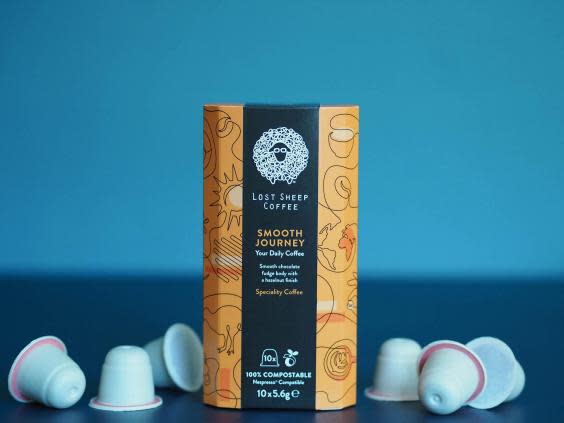
Plastic-free and 100 per cent compostable, Lost Sheep Coffee capsules are made from wood bark. Only ever using Grade 1 single-origin coffee beans sourced from a friend’s Rainforest Alliance Certified farm in Brazil, the beans are then roasted here in the UK’s Garden of England, Kent. It’s this close-knit, fully traceable supplier chain that ensures the farmer can be paid a fair price. Packaging is made using paper from FSC certified forests and despite the lack of plastic, pods are fully airtight so last up to 12 months. The smooth journey pods are the perfect everyday brew, with lightly nutty, milk chocolate notes. If you’re looking for something a little different, the funky camper has a more fruit-forward red berry tasting profile.
Dualit aluminium capsules: £13.80 for a pack of 60, Dualit

Suitable for both Dualit and Nespresso machines, these aluminium capsules are easier to recycle than ever, with most local authorities accepting them. However, what’s inside matters too and these Fairtrade pods deliver when it comes to flavour, with all coffee roasted, ground and popped into the pods in their on-site roaster in West Sussex. There are four blends in the new range including our favourite the orange-hued ristretto, which is the strongest, with creamy chocolate notes and a buttery smooth mouthfeel. There’s also a full-bodied intense (dark brown pod), a purple medium-strength lungo designed for americanos and finally a bright blue decaf version for those shunning the caffeine. Once used, the coffee grounds can be added to compost or a food waste bin, while the capsule and lid can go straight in with your regular recycling. In addition, Dualit has reduced the outer box size resulting in a more compact and space-saving design with no sachet inside, helping to further reduce the environmental impact.
Halo coffee capsule: From £7 for 10, Halo Coffee
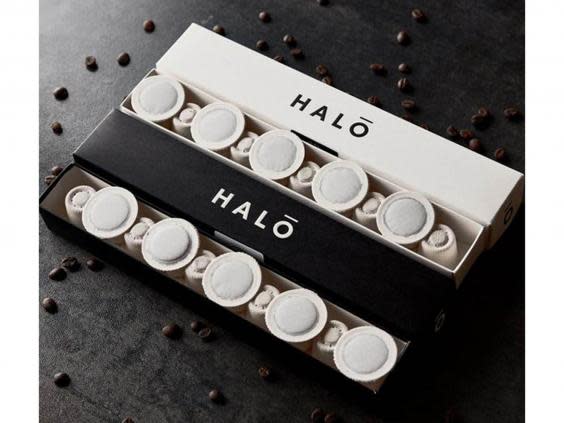
The daterra moonlight, which happens to be Halo’s cheapest coffee, is a single-origin from Brazil. It’s sourced from a family-run farm – the first in the world to be awarded a Rainforest Alliance Grade A. Because the pods are made from 100 per cent compostable sugar cane and paper pulp, they can expand and get a little stuck in the machine, so we found it was best to eject straight after making your coffee for peace of mind. And to ensure you never run out of pods Halo offers a handy subscription service so you can ensure you never have to forgo your caffeine fix.
Eden Project biodegradable Costa Rican coffee capsules: £3.49 for 10, Lakeland

These biodegradable pods use organic, single-origin beans sourced from Costa Rica where the light roast allows nuanced flavours of nuts, spices and citrus for freshness. Medium-bodied and well balanced, once finished you can either compost at home or add to your food recycling bin where they’ll break down within weeks. Enjoy your coffee that little bit more, knowing it’s also not contributing to climate change – pods are produced using energy generated from wind, sun, hydropower and biogas.
Coffee & Kin explore coffee capsules: £4.50 for 10, Coffee & Kin

Aside from being completely plastic-free, biodegradable and compostable, each Coffee & Kin capsule also gives a little back to charity. 1p from each pod is donated to The Blurt Foundation, which helps young people and adults affected by depression in the UK. Along with the fact its speciality grade coffee is ethically sourced and farmers are paid a fair price has led the brand to claim it has the “world's kindest coffee capsule”. There are three blends in the range – discover, escape and our favourite, explore which combines notes of stone fruit with chocolate raspberry brownies. You can buy pods in packs of 10 or join take out a monthly subscription for a regular supply.
Cru Kafe organic espresso: £3.30 for 10, Cru Kafe

Cru Kafe has long been organic and Fairtrade, but now it can also claim to be recyclable as well, thanks to its new aluminium pods. The only thing is you’ll need to scoop out the coffee first though. The espresso version is seriously versatile, working well with milk and sugar in cappuccinos, lattes and flat white but is also delicious drunk alone. Super smooth and creamy, expect notes of milk chocolate, caramel and biscuit. Aside from this blend there are three tasty single origins in the range – a crisp nutty Columbian, a rich chocolatey one from India, and a decaf from Peru.
Novell intenso compostable coffee pods: £3.60 for 10, Novell
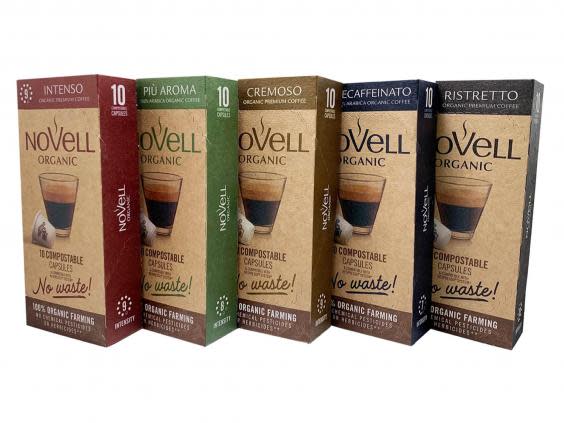
100 per cent organic and compostable, Novell pods come in six different varieties with varying intensities. One of our favourites is the intenso – a blend of coffee sourced from Brazil and Central America with notes of toasted barley, caramelised nuts and delicate acidity. This Spanish brand make its pods with cornstarch which should decompose within four to 12 weeks.
Blue Goose Ethiopian Yirgacheffe compostable coffee pods: £18 for 40, Amazon
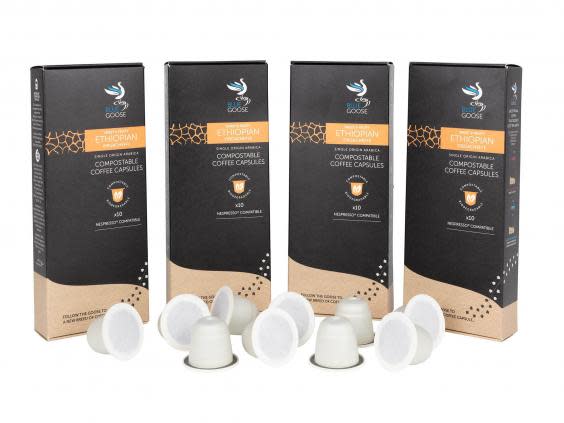
Blue Goose Coffee pods are filled with speciality grade coffee, in this case sourced from Ethiopia. Made from starch and wood bark, the capsules can be placed in food waste collection where they will break down within around 12 weeks. They taste great too with well-balanced acidity and notes of floral blackcurrant. For extra eco brownie points, the compostable pods are produced using renewable energy and packaged in sustainably sourced, recyclable cardboard printed with vegetable inks. It doesn’t end there, the brand makes regular charity donations to water and wildlife projects – with a particular interest in protecting the Abyssinian blue-winged goose (which is where they took their name from).
Moving Beans house espresso blend: £2.80 for 10 pods, Moving Beans
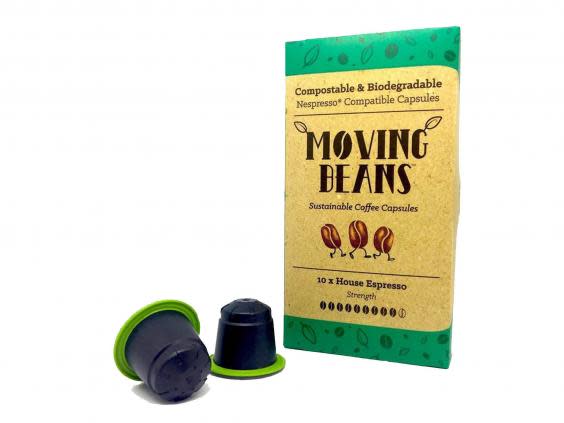
Created out of a clever mix of sugar cane and sugar beet plants, these compostable and biodegradable pods are completely free from plastic and aluminium, so they can be disposed of in your food waste collection bin. The house espresso is a powerful dark roast – the perfect pod to get you going in the morning.
The verdict: Eco-friendly coffee capsules and pods
Suitable for both home and commercial composting, organic, sustainable and carbon-neutral – Roar Gill coffee pods tick all of our eco credentials, and all whilst tasting great to boot.
Read more
7 best espresso machines for barista-quality coffees
7 best cold-brew coffee makers for the perfect chilled drink at home
10 best pod coffee machines redirect test article


